May 1919
Germany
rejects peace terms
May 2
Germany’s Peace Delegates Arrive
At Conference
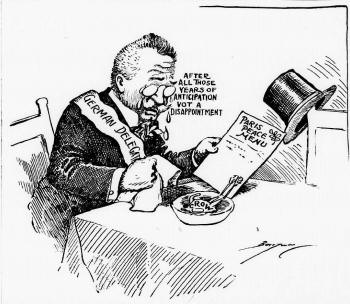 The
first official meeting between
the Allied and the German peace
delegates took place on Thursday
afternoon. The opinion prevails
that the peace terms will be
communicated to the Germans
Monday afternoon.
The
first official meeting between
the Allied and the German peace
delegates took place on Thursday
afternoon. The opinion prevails
that the peace terms will be
communicated to the Germans
Monday afternoon.
The
spacious dining room of the
hotel Trianon received its peace
Congress installation - three
long tables in horseshoe form
covered in green cloth – the
color of politics and games of
hazard. The size of the side
tables is imposing, as they
extend some 50 to 60 feet
through the room. At the head of
the apartment is a table about
35 feet long, at which the
representatives of the great
powers will be seated. Inside
the horseshoe is another table
covered with red plush where the
Germans will sit. In the window
openings are a number of smaller
square tables for secretaries.
Almost
fainting from emotion, the
German Foreign Secretary’s, the
head of the German delegation’s,
pass-through was evidently one
of the bitterest moments of his
life. He was barely able to
sustain himself through the
brief ceremony of presenting his
credentials to the Allied
delegates, before immediately
leaving for the waiting
automobile, which had brought
him to the gathering.
Many
Chapters In Peace Treaty
The
treaty of peace comprises of
fifteen to twenty chapters. The
preamble is contained in the
first chapter, setting forth the
reasons why the various
contracting parties entered the
war and mentioning the necessity
for the League of Nations. The
second chapter deals with the
German frontier and the third
contains all clauses connected
with alterations of frontiers
resulting in changes in the
sovereignty of territory. The
fourth sets forth the military,
naval and aerial clauses and the
fifth contains the disposition
of the German colonies.
The
other chapters are not yet
finished, but they will concern
reparations, economic and
financial questions, and will
deal with the international
labor legislation treaty. The
treaty concludes with a chapter
concerning the guarantees for
the execution of the treaty
conditions in Germany.
The
German delegates to the Peace
Conference will be given fifteen
days in which to consider the
treaty and make any
counterproposals they desire.
They may begin offering their
suggestions at any time, but no
day of grace will be given them
in providing their final answer.
The Allies, it was stated,
reserve the right to reply, or
reject, to any of the German
objections or proposals at any
time. The belief was expressed
that no more than five days
would be required for closing
the exchange of ideas.
While
the date for the presentation of
the treaty to the Germans has
still not been fixed, it
probably will be Monday or
Tuesday. Numerous details remain
to be approved, but
consideration of them has
reached such a stage that it is
reasonably certain that the
peace documents can be whipped
into shape in the next three or
four days.
May 9
Rigorous Peace Terms Are Handed
To Germans
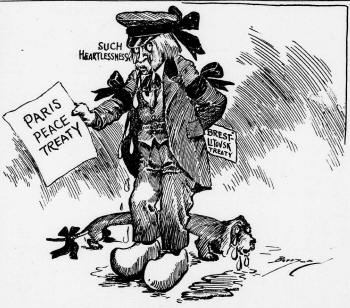 The
treaty of peace between the 27
Allied and associated powers on
the one hand, and Germany on the
other, was handed to the German
delegates on Wednesday. It is
the longest treaty ever drawn.
It totals about 8,000 words,
divided into fifteen main
sections, that represent the
combined product of over 1,000
experts working continually
through a series of commissions
for the 3 ½ months since January
18. It does not deal with
questions affecting
Austria-Hungary, Bulgaria and
Turkey, except so far as binding
Germany to accept any agreement
reached with those former
allies.
The
treaty of peace between the 27
Allied and associated powers on
the one hand, and Germany on the
other, was handed to the German
delegates on Wednesday. It is
the longest treaty ever drawn.
It totals about 8,000 words,
divided into fifteen main
sections, that represent the
combined product of over 1,000
experts working continually
through a series of commissions
for the 3 ½ months since January
18. It does not deal with
questions affecting
Austria-Hungary, Bulgaria and
Turkey, except so far as binding
Germany to accept any agreement
reached with those former
allies.
The
contents of the first five
chapters of the treaty have
already been outlined, dealing
with the preamble, German
frontiers, territory changes,
German colonies and the military
naval and aerial features of the
pact. The sixth chapter defines
the status of prisoners of war,
and the seventh concerns the
responsibilities of the former
Emperor and other Germans for
the war. The eighth and ninth
chapters are devoted to phases
of the reparations problem and
financial clauses. The tenth
deals with economic clauses, the
eleventh with ports, railroads
and border communications, the
twelfth concerns international
labor legislation, the
thirteenth embraces guarantees
and the fourteenth contains
general clauses dealing with
ratification.
Germany,
by the terms of the treaty, is
required to restore
Alsace-Lorraine to France,
accepts the internationalization
of the Saar Basin temporarily,
and of Danzig permanently,
agrees to territorial changes
towards Belgium Denmark and East
Russia, cedes most of upper
Silesia to Poland, renounces all
territorial and political rights
outside of Europe and recognizes
the total Independence of German
Austria, Czechoslovakia and
Poland.
Her army
is to be reduced to 100,000 men,
conscription within her
territories is abolished, and
all importation, exportation and
production of war materials is
to be stopped. Allied occupation
of parts of Germany will
continue until reparation is
made.
The
German Navy is to be reduced to
six battleships, six light
cruisers and twelve torpedo
boats, without submarines. All
other vessels must be
surrendered or destroyed.
Germany may have no military or
Naval Air Force except 100
unarmed seaplanes for search and
rescue purposes.
Germany
must accept full responsibility
for all damages caused worldwide
and must agree specifically to
reimburse all civilian damages
beginning with an initial
payment of twenty billion marks,
subsequent payments to be
secured by bonds to be issued at
the discretion of the
reparations commission.
The
peace treaty prevents Germany
from signing an alliance with
the Russian Bolsheviks and for
the incorporation in Germany of
German Austria. Austria will be
made a neutral republic under
the eyes of the League of
Nations with the prohibition
that she shall not incorporate
herself with Germany. Meanwhile,
Alsace-Lorraine will be given
absolutely to France.
The
complete economic isolation of
Germany is being considered by
the Council of Foreign Ministers
of the Peace Conference as a
measure to be adopted in the
event Germany refuses to sign
the peace treaty.
Should a
refusal by the Germans to sign
the treaty lead to a further
invasion of Germany, the
maneuver will be carried out
almost entirely by French
troops. By June 3, unless
present orders are changed,
there will be only two American
divisions on the Rhine and the
British forces will be
correspondingly reduced.
Marshall
Foch, on his first tour of the
zone of occupation, is arranging
just what part the American and
British forces will play in any
eastward advance. He is also
completing his program by which
the French will take over a
larger part of the American area
in the first day of June,
whether the treaty is signed or
not.
Surrender Of Colonies To Be
Chief Objection Of German
Delegates
Germany’s initial response was
provided to the Allied powers
almost immediately, and was
translated sentence by sentence
by the German interpreters, who
did not fail to bring, with full
emphasis, every sharp face of
it, and the three Allied
statesman put their heads
together with evident anger at
more than one of the German
spokesman's cutting utterances,
as if they were deliberating
upon the advisability of
immediate answer.
Among
the terms of the treaty which
the Germans found the most
objectionable is that relating
to the surrender of her
colonies. They will urge that
German East Africa, Togoland,
and Mamerun should be left to
her, and, upon refusal, she will
be asked to be assigned some
part in the future
administration of her former
colonies. They will ask that in
any case Germany shall not be
barred from purchasing some
Portuguese colonies at a future
date, should Portugal be willing
to sell.
A plea
also will be made that the Saar
region shall revert to Germany
after a term of years. The
delegates will oppose any
proposal to deprive them of
sovereignty over the Kiel Canal.
They will also oppose any
so-called Polish corridor which
guarantees the right of free
transit by Poles, both by rail
and by river, to Danzig, and
while opposing any plan to
deprive them of sovereignty over
the city itself, they will agree
that portions of Danzig shall be
regarded solely for Polish
commerce.
The
German delegates complained
bitterly to one of the French
liaison officers of the
unexpected harshness of the
conditions of peace. The
delegates said they expected
from the newspaper reports that
the demands in many respects
would be far-reaching, but were
not prepared for the terms as
actually laid down in the
printed copy of the document.
The
German government has not yet
submitted any communication with
regard to the peace treaty. All
exchanges between the delegates
and the home government are
being kept secret.
As the
terms of the peace treaty became
known in Germany, the German
press was quick to suggest only
one immediate solution - peace
with Russia and the use of
Bolshevik troops to defend
Germany. According to one German
Peace Conference delegate: "The
cruel predictions of the Allied
press as to the conditions that
would be imposed upon Germany
have been exceeded." Another
German delegate said the
document is "simply awful." It
is reported that the opinion of
the German people would prefer
anarchy than submit to such
slavery, as the peace treaty
would force upon Germany.
According to German press, all
the parties, from the extreme
left to the extreme right,
regard the peace treaty as
impossible to accept. It is
generally believed that the
Germans will answer the treaty
of peace with a counter
proposal.
May
17
Experts See Danger In Peace
Terms
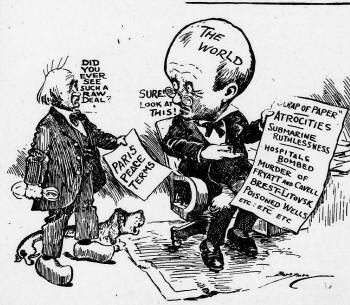 Germany's
reply to the terms of peace will
be a proposal for a "’Peace of
right’ on the basis of a lasting
peace on nations," according to
a proclamation issued to the
German people by German
President Ebert.
Germany's
reply to the terms of peace will
be a proposal for a "’Peace of
right’ on the basis of a lasting
peace on nations," according to
a proclamation issued to the
German people by German
President Ebert.
The
proclamation says the current
treaty would deliver German
labor to foreign capitalism for
the indignity of wage slavery
and permanently cripple the
young German Republic. The
proclamation closes with an
appeal to the German people to
"stand together, knowing no
parties, and to preserve with
the government mutual trust in
the path of duty in the belief
of the triumph of reason and
right."
The text
of the proclamation is as
follows: "The first reply of the
Allies to the sincere desire for
peace on the part of our
starving people was the laying
down of the uncommonly hard
armistice conditions. The German
people, having laid down its
arms, honestly observed all the
obligations of the armistice,
hard as they were.
Notwithstanding this, our
opponents for six months have
continued the war by maintaining
the blockade. The German people
for all these burdens, trusting
in the promise given by the
Allies in their note of November
8, that the peace would be a
‘piece of right’ on the basis of
President Wilson's 14 points."
"Instead
of that, the Allies have now
given us peace terms which are
in contradiction to the promise
given. It is unbearable for the
German people and is
impracticable, even if we put
forth all our powers. Violence
without measure would be done to
the German people. From such an
imposed peace, fresh hatred
would be bound to arise between
the nations and in the short
course of history they will
bring new wars."
"The
dismemberment and mangling of
the German people, the
delivering of German labor to
foreign capitalism for the
indignity of wage slavery, and
the permanent fettering of the
young German Republic by the
Allied imperialism is the aim of
this ‘Piece of Violence’. The
German People's government will
answer the peace ‘Proposal of
Violence’ with a proposal of a
‘Peace of Right’ on the basis of
a lasting peace of the nations."
"The
German government will put forth
every effort to secure for the
German people the same national
unity and independence, and the
same freedom of labor and
economical and cultural respects
which the Allies want to give to
all the people of Europe, save
only our people."
"Our
nation must save itself by its
own action. In view of this
danger of destruction, the
German nation and the government
must stand by each other,
knowing no parties. Let Germany
unite in a single will to
preserve German nationality and
liberties. Every thought and the
entire will of the nation ought
now to be turned to labor for
the preservation and
reconstruction of our
Fatherland. The government
appeals to all Germans in this
hard hour to preserve with it
mutual trust in the path of duty
and in the belief in the triumph
of reason and of right."
"Sign, But World Revolts," Is
The Cry In Germany
"Even if
important changes are not made
by the negotiations, there
remains no choice but to bow to
the compulsion and sign the
treaty," says an appeal of the
Central Committee of the
Independent Socialist Party in
Germany.
"Not
signing means the retention of
our prisoners of war, the
occupation of our raw material
districts, the tightening of the
blockade, unemployment, hunger
and death en masse. It is the
proletariat that would suffer
the most terribly from the
consequences. Peace as hard and
as oppressive as it may be is a
necessity for the rebuilding of
our social and economic life in
the spirit of the revolutionary
proletariat."
"To keep
our nation alive - that and
nothing else - is our duty. We
are not pursuing nationalistic
dreams; no question of prestige
and no thirst for power have a
part in our deliberations. Life
is what we must have for our
land and nation today. While
everyone feels our throttling
hand at his throat."
"The
thing which is at the basis of
our discussion is this the
volume in which 100 sentences
begin with Germany renounces…
this dreadful and murderous
volume, by which confessions of
our own unworthiness, our
constant to penniless
disruption, our agreement to
helotry and slavery, are to be
extorted - this book must not
become the future code of law."
The
appeal concludes with a demand
that the workmen of all
countries unite against
capitalism for world revolution.
May
23
Germany declines To Sign Peace
Terms
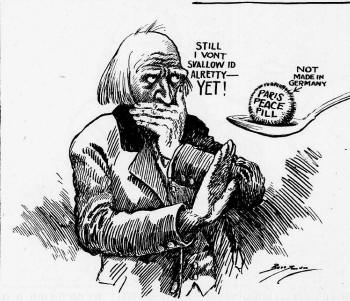 German
President Ebert, in addressing a
demonstration in Berlin, said
that he would never sign the
peace terms. He described the
peace terms as the product of
the enemies’ vengeful hysteria,
adding, neutral foreign
countries will not permit the
proscription of Germany. They
will raise their voices with us
that this piece of enslavement,
which we will never sign, shall
not come to pass.
German
President Ebert, in addressing a
demonstration in Berlin, said
that he would never sign the
peace terms. He described the
peace terms as the product of
the enemies’ vengeful hysteria,
adding, neutral foreign
countries will not permit the
proscription of Germany. They
will raise their voices with us
that this piece of enslavement,
which we will never sign, shall
not come to pass.
President Ebert said, "the peace
terms spell the economic
destruction, political dishonor
and moral degradation of the
entire German nation not only
for the present, but also for
still on board generations."
"These
consequences must logically
follow acceptance of the peace
conditions the American press
itself has recognized without
question. Towards them Germany
took the standpoint that
acceptance of such conditions
could not be demanded and that
the Allies were unjustified in
imposing such demands."
"Germany
has not only a moral right to
compliance with the general
promises made it when signing
the terms of the armistice, but
a right to justice and
recognition, instead of the
paragraph song of hate which was
written at Versailles."
However,
a member of the German
delegation who returned to
Versailles said, "we will sign
despite all, because we will be
hacked to pieces if we return to
Berlin without signing. However,
mark my words, by signing, I
will set in motion a Second
World War which will be more
brutal and more devastating than
the first one."
Serious
disagreements have arisen in the
past 24 hours among the German
delegates. A majority, including
the financial experts, are said
to be violently opposed to
signing the treaty, while the
minority see no way out but to
sign. Field Marshal von
Hindenburg is reported to have
told the delegates that all
resistance was impossible and
that the military leaders were
inclined to the necessity of
signing the treaty, as abhorrent
as it was.
Huns
To Propose Economic Parlay
It is
apparent that one of the
principal points of the German
reply to the peace terms will be
a proposal to institute a joint
committee of representatives of
both sides, with a neutral
President, to decide the
economic questions. The Germans
also will suggest the
appointment of a similar
committee to determine the
damage done to Belgium and
France.
The
German reply, it is understood,
will protest that the treaty
does not take into consideration
the damage done in Germany. It
will also urge that
Austria-Hungary, having been an
ally of Germany, should be held
in the same responsibility as
Germany.
Full
realization of the peace terms
has restored some of the
nationalist feeling in Germany,
which seemed entirely to have
vanished, and today there is
almost solid national opinion
against the treaty. Germany is
slowly finding men around whom
she will rally. Then soon they
may be the storm center of the
attempted peace settlement.
May
30
Germans Prepare Counter Peace
Proposals
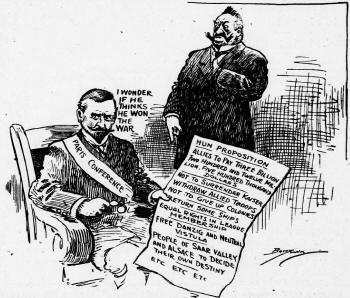 Information
has been received that the
counterproposals to be made by
Germany to the Peace Conference
will declare in favor of
military disarmament, saying
that Germany is ready to reduce
her forces to 350,000 within two
months after the conclusion of
peace, and by the expiration of
another year to cut the size of
the Army down to 200,000 men.
Information
has been received that the
counterproposals to be made by
Germany to the Peace Conference
will declare in favor of
military disarmament, saying
that Germany is ready to reduce
her forces to 350,000 within two
months after the conclusion of
peace, and by the expiration of
another year to cut the size of
the Army down to 200,000 men.
It will
be declared that in spite of the
internal disorders and the
necessity of defending her
frontiers Germany agrees to
disarm ahead of all other
powers. It is pointed out that
this gives adequate proof of
Germany's determination to
renounce all military and
imperialistic tendencies.
However,
the same report said Germany
should refuse to sign the
military and economic terms of
the peace treaty, which are not
acceptable. So far, the Germans
have submitted thirteen notes
protesting various aspects of
the proposed peace treaty.
The
German delegation insisted
Germany's only responsibility is
for the violation of Belgian
neutrality, which it is ready to
make reparations for, and
declares that all the powers
were responsible for the war and
that the material damage done
was the work of the Allied
armies, as well as the Germans.
With the
exception of one minor
concession, all suggestions and
counterproposals by Germany for
the disposition of the Saar
Valley have been rejected by the
Allied powers. The concession
agreed to is that Germany might
create a prior charge upon her
assets or revenue for the
payment of the mines in the Saar
Valley.
In
addition, the German
counterproposal will include a
demand that the administration
of the Rhine district shall
remain German; Germany to
deliver coal to France from the
Ruhr and Saar Valley, but not to
the knowledge France’s ownership
of that land.
According to reports, the German
cabinet is in full accord with
respect to the general outlines
and the specific proposals of
the counter proposals, which
will make up the German reply.
Meanwhile, rumors and scares
over prospective occupation by
the Allies have been on the
increase recently in western
Germany. Newspapers publish
editorials urging the people to
keep cool and be prepared to a
set philosophy of the events of
the next few weeks, even
occupation by Allied troops.
Virtually every newspaper from
unoccupied Germany makes mention
of Allied soldiers marching
Eastward from the Rhine in the
event that Germany refuses to
accept the peace terms. The
population is cautioned against
demonstrations if the troops
appear.
Read past editions of News Reports From the Front